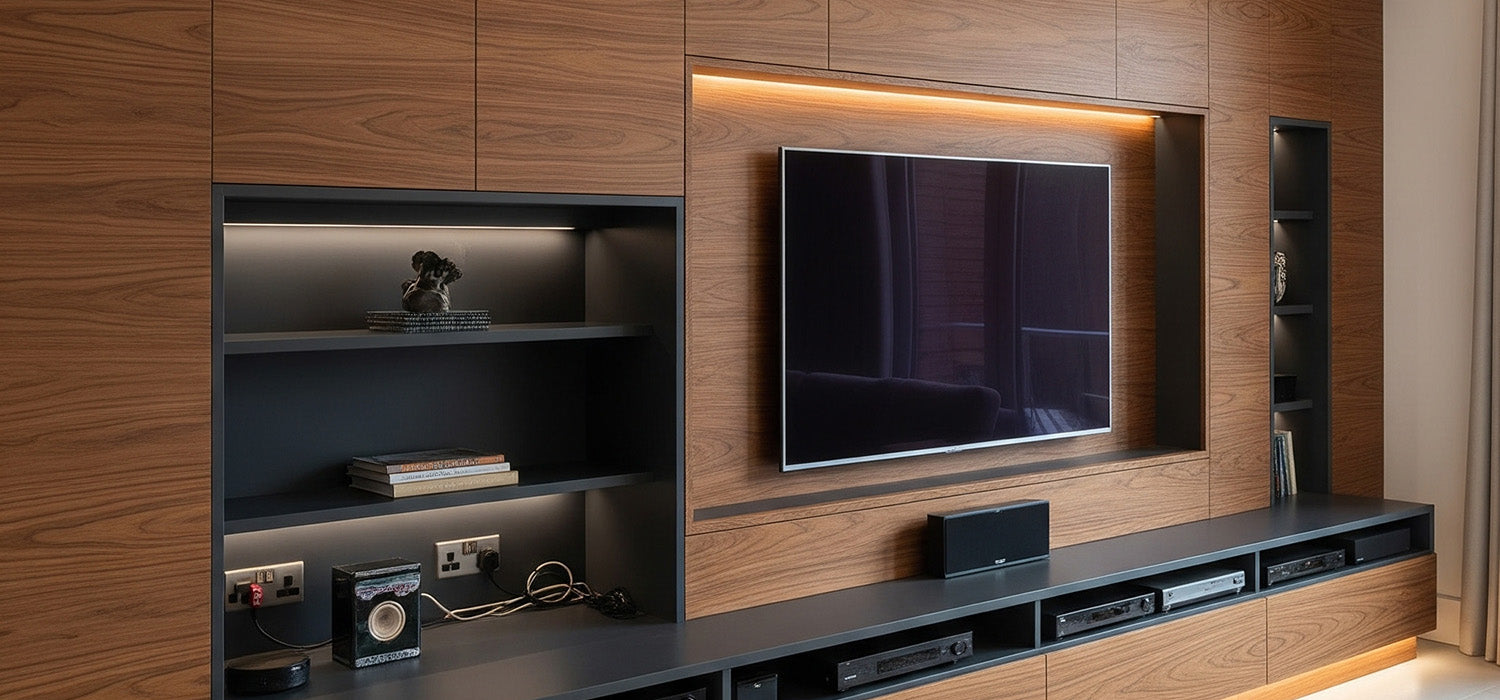
Media Wall Covering: Stylish Finishes to Elevate Your Space
Blank wall behind your TV? That Media Wall Fire deserves better than bare plasterboard. Media wall coverings—from slatted panels to luxe wraps—add texture, style, and wow factor. Short answer: it’s the final layer that makes your media wall pop. Stick around for bold finishes, tips, and juicy design inspo.
Why Choose a Special Wall Covering for Your Media Wall?
Let’s be honest—once you’ve mounted the TV, wired in your Media Wall Fire, and stepped back, something can still feel unfinished. That’s where a surface covering steps in. It doesn’t just hide plasterboard—it turns your wall into a feature.
Whether you're sprucing up a sleek new build or giving a tired lounge a facelift, a good covering adds character, style and even helps the room feel more pulled together.
Creating a Dramatic Focal Point
Your media wall is often the first thing people notice. Why not make it sing?
Coverings like timber slats, bold wallpaper or textured finishes create depth and visual intrigue. Think of it like a great jacket—it completes the look and sets the tone.
Beyond Just Paint: Adding Visual Interest
Paint is simple, but on its own it can fall flat. Want a wall that people talk about? Try layering in textures like microcement, 3D panelling, or slatted wood. They give your wall structure, warmth, and a bespoke edge that paint alone just can’t.
Enhancing Room Aesthetics and Mood
The right covering transforms more than just the wall. It shifts the entire feel of the room.
Imagine a calming blue suede effect in a coastal-style space, or dark walnut panels paired with brass shelving in a moody home cinema. It’s not just about aesthetics—it’s about atmosphere.
Texture, Pattern, and Colour Impact
Different materials create different moods. Velvet-textured wallpaper feels soft and plush, while exposed brick panels evoke industrial cool. Don’t underestimate the power of colour either—navy can feel cocooning, while lighter tones reflect light and feel fresh.
Concealing Imperfections and Protecting the Wall
Media wall builds often leave behind seams, screw holes or filler marks. A well-chosen surface covering hides all that, keeping things neat and seamless. It's also more resilient—great if little ones treat your living room like a racetrack.
Potential Acoustic Benefits
Fabric panels or slatted wood don’t just look good—they help absorb sound too. That can soften echoes and boost your movie-watching experience. Especially useful if your room has hard floors or high ceilings.
Popular Types of Media Wall Coverings
Now for the fun bit—choosing your material. Here’s what’s trending (and lasting) in British homes.
Wallpaper and Murals
Wallpaper has had a major glow-up. It's no longer all florals and fiddly rolls—it’s bold, textured, and expressive.
Patterned, Textured, and Photo Murals
Want to make a statement? A jungle mural behind your TV or a metallic print adds real drama. Textured papers—like linen-look or faux stone—feel luxurious without needing structural changes.
Peel-and-Stick vs. Traditional Wallpaper
Peel-and-stick is perfect if you're renting or just fancy a refresh down the line. Traditional paper is trickier to hang but offers deeper texture and a more premium finish.
Textured Paints and Finishes
Not all paint is made equal. Specialist finishes can elevate even a small space.
Venetian Plaster, Suede Effect, Concrete Effect
Venetian plaster is smooth and polished with a marble vibe. Concrete effect paint suits urban or minimalist homes. Suede finishes feel soft and tactile—ideal for bedrooms or cosy lounges.
Fabric Wall Coverings and Upholstered Panels
Think hotel chic. These coverings are soft to the touch and reduce echo.
Adding Softness, Warmth, and Sound Absorption
They work well behind shelving or in a reading nook. Bonus? They hide bumps and make the space feel insulated, both visually and physically.
Wood Panelling or Slats (as a "covering")
Slatted walls are having a moment—and for good reason.
Natural Warmth and Architectural Interest
Vertical oak or walnut slats bring texture, rhythm and a modern architectural feel. Perfect for Scandi or Japandi interiors, they also pair beautifully with LED strip lights for a warm glow.
Decorative Panelling (e.g., 3D PVC, MDF panels)
Looking for something striking? 3D panels are affordable but don’t look it.
Modern Geometric or Abstract Designs
Use wave patterns or honeycomb shapes painted in moody colours. They catch the light and give the wall a sculptural effect.
Microcement or Resin Finishes
If minimal and modern is your style, you’ll love these.
Industrial and Contemporary Looks
Microcement is seamless, matte and super chic. Resin offers a glossy, almost glass-like finish. Both are wipeable and work beautifully behind Media Wall Fires or open shelving.
Designing with Your Media Wall Covering
Matching the Covering to Your Interior Style
A covering should feel like it belongs. Match your material to the mood of your space.
Modern, Traditional, Eclectic, Industrial
-
Modern: think concrete finishes or crisp slats
-
Traditional: go for wallpaper or wood panelling
-
Eclectic: layer textures—brick, wallpaper, and wood
-
Industrial: raw cement, exposed brick, or black metal trims
Colour Palette and Light Reflection
Colour affects everything—from how big a space feels to how the TV looks on the wall.
Dark vs. Light Coverings
Dark tones add intimacy, perfect for home cinemas. Lighter shades feel breezy and make small rooms feel bigger. Glossy finishes bounce light, while matte ones feel grounded and serene.
Integrating with Lighting and Shelving
Choose a finish that works with your wall’s extras. Highlight timber with warm LEDs or spotlight mural details with ceiling-mounted track lighting. Shelving looks great when the backdrop offers contrast.
Considering the TV's Contrast Against the Covering
Too much texture behind the screen can be distracting. Instead, go for balance: smooth finishes behind the TV, and bolder textures on the sides or around shelving.
Preparation and Installation of Media Wall Coverings
Preparing the Wall Surface
Every good finish starts with a good base.
Cleaning, Smoothing, Priming
Clean off dust, fill gaps, sand flush and prime. Each material needs its own prep, so check product instructions too.
Measuring and Cutting Accurately
Measure twice, cut once. Especially if you’re working with panels, wallpaper patterns or limited materials.
Application Techniques for Different Materials
Adhesives, Fasteners
Wallpaper and wraps usually need adhesive or peel-and-stick backing. Panels often need screws or strong construction glue. Always test a small section first to check grip.
Navigating Around TV Mounts and Outlets
Mark out sockets and screen brackets before you start. If in doubt, create access hatches or use clip-on panels that allow for easy removal.
DIY vs. Professional Installation
If you’ve got patience, some coverings can be DIY-friendly. But for microcement, resin, or large murals, a professional will save you time—and headaches.
Maintenance and Longevity of Your Media Wall Covering
Cleaning Instructions for Various Materials
Each finish has its own care routine:
-
Painted: wipe with a damp cloth
-
Wallpaper: dust gently, avoid moisture
-
Fabric: vacuum with upholstery attachment
-
Wood: dust and use appropriate polish
-
Microcement: wipe with pH-neutral cleaners
Protecting from Wear and Tear
Position furniture carefully, avoid sharp objects brushing up against the wall, and be cautious with heat from fires. For added protection, consider applying clear finishes or protectors to high-touch areas.
Conclusion: Making a Statement with Your Media Wall
A media wall without a proper finish is like a frame without art. The right covering sets the tone, shows off your Media Wall Fire, and elevates your space.
Whether you go for calming suede, bold murals, or sleek slats, don’t settle for basic. Your wall deserves to be the backdrop to great moments—and great style.
Other content we think you'll love
- Bedroom Media Wall Ideas: Create a Stylish & Cosy Retreat
- Corner Media Wall Ideas: Smart Design for Tricky Spaces
- How to Build a Media Wall Over Carpet Safely and Securely
- Black Media Wall Ideas for Bold & Stylish Living Spaces
- How to Build a Media Wall Backboard for a Sleek TV Setup
- Media Wall Cladding: Add Texture, Style and Wow Factor
- Media Wall Construction: How to Build the Ultimate Feature Wall

